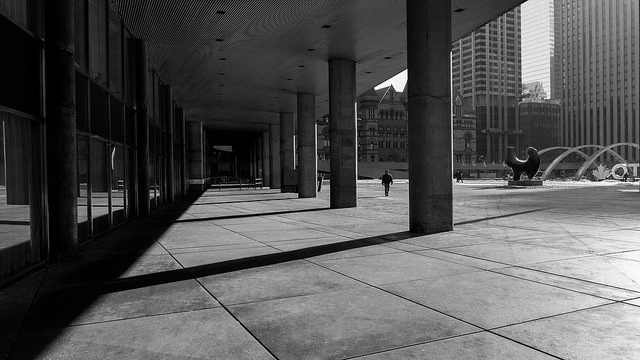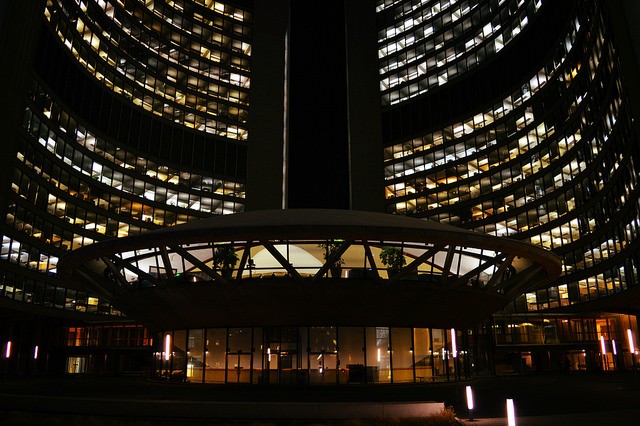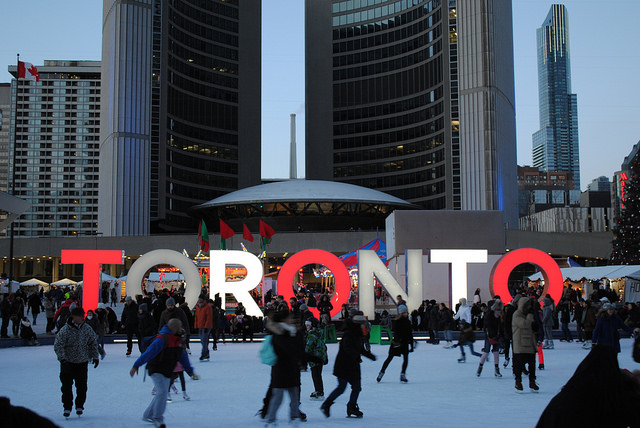Crossposted from Torontoist.
In his annual address, the city manager lays out some of the challenges that Council should confront.

Photo by Neville Park.
We went to the city manager’s address so you didn’t have to.
Every year, academics, wonks, politicos, and other assorted nerds assemble at U of T to listen to the city manager hold forth on the City’s financial situation. Yeah, we know you’re already bored, but this is important! It’s a rare opportunity to hear directly from Toronto’s top civil servant with more candour, less political spin.
City Manager Peter Wallace is fond of metaphors. During his talk, we saw the triumphant return of the $29 billion Unfunded Capital Projects Iceberg. He also likened the City’s lack of a long-term operating budget plan to speeding down a gravel road with only parking lights on. But this was the winner:
There is a little bit of complacency. There’s a little bit of comfort…basically, “Well, it’ll always work out.” And I’m going to draw an analogy here: smoking. Doctors will bother people about smoking and suggest that maybe smoking isn’t a good idea, and a lot of smokers…have the idea, “I’m still here. I was here last year, I’m here this year, then smoking is okay because it hasn’t killed me yet.” And the reality is…these things are risky behaviours, and they might well catch up. As a public servant I take risks with great seriousness; I advise that risks should be mitigated, managed, and minimal. And right now, we are very heavy smokers in the City of Toronto.
This risky behaviour is, of course, Council’s long-standing habit of voting to improve public services and embark on new projects while simultaneously restricting its means of paying for them. There is an ever-widening gap between Toronto’s vision, expressed in policies and grand projects, and actions—expressed in what the City actually funds.
The city manager was quick to clarify that it’s not just a matter of the structural deficit, which dates back to amalgamation. It’s also a challenge for the immediate future. (The 2017 budget gap will be around $607 million; in 2018, $438 million.) He also repeatedly expressed concern for the long-term consequences of Council’s years of nickel-and-diming. Constant cuts to City administration have kept it stuck in the past. “I’m signing attendance slips,” Wallace exclaimed in frustration at one point. “I should never be signing attendance slips.”
In the short term, the results of budget cuts—crappy transit, crumbling housing, underfunded social services—are shunted off to individuals. In the long term, this has a generational impact, reinforcing systemic social issues like poverty and segregation that once again become the City’s responsibility. Much of this could have been mitigated, Wallace implied, if Council had actually increased property tax revenue to keep up with the cost of living in the past. But Council has consistently found raising property taxes to be unacceptable, and “recommending the unacceptable is not a great way for a public servant to make a living.”
The alternative is harsh. Wallace is preparing to force a chain-smoking Council to go cold turkey. No fruitless appeals for provincial funding; no “aspirational” revenue tools that the City can’t actually implement; no committing to shiny new projects while existing gaps go unfilled. If Council refuses to raise property taxes, they’re going to see what it actually costs. December, when the 2017 budget proposal gets launched at city hall, is going to be fun.
The city manager discussed much more in his speech; if you’re really interested, you’ll be able to watch it for yourself. The event was recorded, and we’ll add a link to the webcast when IMFG makes it available.
Past City Manager’s Addresses
The post The City Manager’s 2016 State of Toronto Address: It’s Time to go Cold Turkey appeared first on Torontoist.




